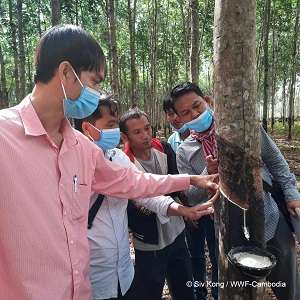 WWF-Cambodia and the General Department of Rubber of the Ministry of Agriculture, Forestry and Fisheries (MAFF) signed a Memorandum of Understanding (MoU) on their first cooperation to build a multi-actor partnership for transparent and sustainable natural rubber supply chains in Cambodia.
WWF-Cambodia and the General Department of Rubber of the Ministry of Agriculture, Forestry and Fisheries (MAFF) signed a Memorandum of Understanding (MoU) on their first cooperation to build a multi-actor partnership for transparent and sustainable natural rubber supply chains in Cambodia.
Funded by the German Government’s Federal Ministry for Economic Cooperation and Development (BMZ) through Welthungerhilfe, the multi-actor partnership cooperation is also implemented in other countries in Southeast Asia, including Thailand and Myanmar.
In Cambodia, the three-year cooperation involves relevant key actors from the Royal Government, private sector, NGOs, and rubber smallholders in Mondulkiri to promote sustainable rubber production, contributing to the improvement of the livelihoods of the rubber smallholders, indigenous people, and workers.
The partners together with Cambodia Rubber Research Institute (CRRI) launched a technical guidebook for Good Agricultural Practices (GAP) in latex harvest techniques and provided necessary training, practical demonstration, and hands-on experience at rubber plantation sites to a total of 60 rubber smallholders and government officials combined from 20 provinces across the country.
Currently, 100 rubber smallholders from five Community Protected Areas adjacent to the WWF’s supported Srepok Wildlife Sanctuary, were already engaged with the aim to reach 300 rubber smallholders by 2022.
